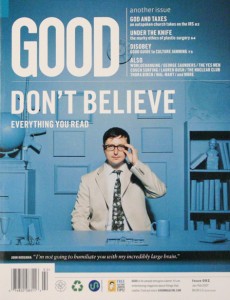Is the Future of Publishing…GOOD?
 The bad news in the publishing industry didn’t let up last week as reports of cutbacks and layoffs and dramatically decreased revenues continued to pour in, and TheMediaIsDying tweeted every depressing bit of it, from major publications to small local radio stations, the rare bit of positive news they offered up paling in comparison.
The bad news in the publishing industry didn’t let up last week as reports of cutbacks and layoffs and dramatically decreased revenues continued to pour in, and TheMediaIsDying tweeted every depressing bit of it, from major publications to small local radio stations, the rare bit of positive news they offered up paling in comparison.
One tweet in particular caught my eye because the issue in question had just arrived in the mail, one of several unsolicited “trial subscriptions” that have come my way recently, presumably to shore up increasingly problematic rate bases for ad-supported magazines:
themediaisdying The February WIRED is only 113 pages, of which only 31.5 are ad pages, per alleyinsider.com – not the usual 1:1 ratio. (@woodenhorsepub) 10:55 AM Jan 23rd from TweetDeck
Interestingly, there’s a letter to the editor in that issue that tweaks Wired about the amount of advertising they usually run, with a surprisingly defensive (and five times as long) reply that concludes with: “P.S.: Advertisers, please do not read this note.”
About an hour before that depressing tweet, GOOD magazine’s blog ran an interesting, if somewhat self-serving post, “Don’t Be (Quite As) Evil“, that posed the question, more or less, What if companies stopped advertising completely and, instead, put that money towards doing good things and getting PR for it?
These are scary days if you’re in the ad business, and not because the economy has bolted out from under us and off into a canyon. No, it’s scary because on the other side, there’s more terror still, because even when consumers begin to buy again, it’ll be harder to reach them. They don’t buy print media; they skip past television ads using their DVRs; they ignore pop-ups and banner ads online. And even if they’ve noticed your ads and go shopping for your gizmo, your $300 million ad-spend might be undone by a single, anonymous reviewer on Amazon: “This product sucks.”
Against that background of flailing ad effectiveness, companies are shifting their ad budgets, one tiny step at a time, towards meaningful P.R., dedicated to noble causes. But what’s stopping a massive company from working at a grander scale, to really do something?
The unavoidable answer: It’s because of you. It’s because you’re too uninformed, too indifferent, and too cynical. I’ll explain. Consumers haven’t quite yet proven that they put money where they’re morals are—or that they’re willing to spend the time and effort to figure out what’s moral to begin with. Too often, cynicism yields to blanket indictments of “corporate America,” which leaves businesses with few incentives to try harder. What really prevents big companies from investing more is the nagging fear that you, the consumer, won’t notice. Or what’s worse, that even if you do, you’ll never reward them for it.
Despite being marred by a gross over-simplification of how advertising works and an unfortunate “blame the reader” angle, it’s worth reading as its underlying premise is sound: companies should do good things and tell people about their efforts.
In the context of advertising vs. PR, though, and the currently precarious state of publishing, as the cover of their second issue (above) noted: “Don’t Believe Everything You Read”.

 With only a few days remaining for last-minute surprises, 2008 has been one for the books on so many levels — personally, professionally, globally — the mind truly does reel.
With only a few days remaining for last-minute surprises, 2008 has been one for the books on so many levels — personally, professionally, globally — the mind truly does reel.

